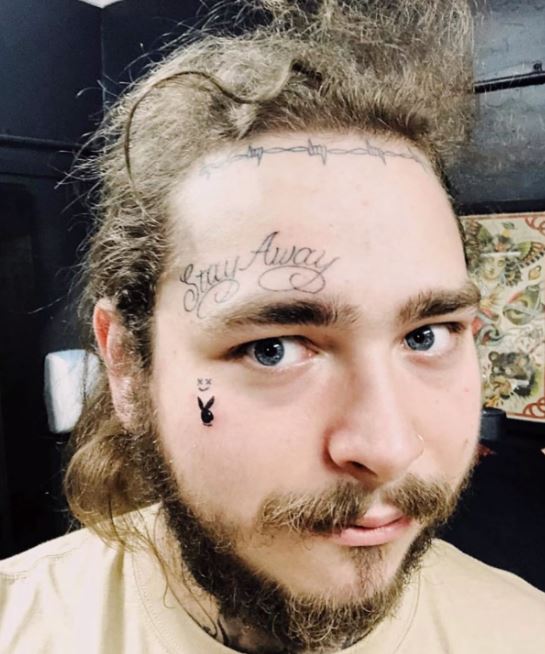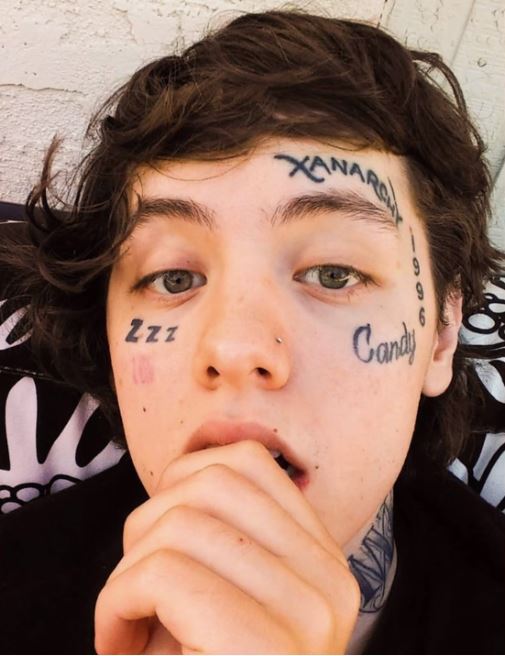Has the art of tattooing, particularly on the face, become a defining element of modern rap culture, transforming artists into walking canvases of self-expression? It's undeniable that face tattoos have transcended mere body art, becoming a powerful symbol of identity, rebellion, and the evolving aesthetics of the music industry.
The landscape of hip-hop and rap music has undergone a significant transformation over the years, with various artists pushing boundaries and challenging traditional norms. One of the most striking developments in this evolution is the rise of face tattoos as a form of self-expression and artistic identity. This trend is not limited to any specific genre, but it has found a strong foothold within the realm of rap, where artists often use visual elements to amplify their message and connect with their audience on a deeper level.
| Category | Details |
|---|---|
| Full Name | Austin Richard Post |
| Born | July 4, 1995 (age 28 years), Syracuse, New York, U.S. |
| Genres | Hip hop, pop, R&B, trap rock |
| Labels | Republic |
| Occupation(s) | Singer, rapper, songwriter, record producer |
| Years active | 2015present |
| Associated acts | 21 Savage, Swae Lee, Quavo, Ty Dolla $ign, Young Thug, Justin Bieber |
| Notable works | "White Iverson", "Congratulations", "Rockstar", "Better Now", "Sunflower" |
| Reference | Wikipedia |
Post Malone, an American singer, record producer, rapper, and songwriter, stands out as a prominent figure in this realm. He is one of the white rappers who has embraced face tattoos, solidifying his position as a key figure in the evolving landscape of music and self-expression. His journey to fame began in 2015 with the launch of his debut single, "White Iverson," which propelled him into the spotlight and set the stage for his career.
Malone's success was further solidified when he secured a deal with Republic Records following the release of his debut single. This marked a pivotal moment in his career, providing him with the resources and platform needed to amplify his musical endeavors. The single achieved impressive success, peaking at the top of the charts. His rise to prominence challenged traditional norms and sparked conversations about the evolution of musical genres.
The concept of the "white rapper" has a complicated history in music. While artists like Macklemore have achieved mainstream success, the genre also faces scrutiny regarding cultural appropriation and authenticity. Post Malone, however, carved his own path. He didn't conform to pre-set expectations; instead, he became a figure of self-expression, and embracing face tattoos was a part of that. Post Malone is one of the most iconic lovers of face tattoos, solidifying his position as a key figure in the evolving landscape of music and self-expression. "Always" and "Tired" are inked under each of his eyes, along with a buzzsaw on his cheek, each tattoo tells a piece of his story.
Lil Wayne is another artist whose face is covered in tattoos. Rappers like Birdman and Soulja Boy have also been known for their tattoos, and they are both rethinking their ink, and working towards getting some of their tattoos removed. This highlights the complex relationship between artists and body art. The motivations behind this transformation are as varied as the individuals themselves, showcasing the personal and artistic journey that many artists undertake.
Lil Uzi Vert is known for having numerous face tattoos, with their face becoming an evolving canvas over the years. Their most recent addition includes a giant floral pattern covering the entirety of their forehead. They also have numerous tattoos surrounding their eyes, including a cross and a number of tribal Adrinka symbols. These tattoos showcase the diversity and personal narratives within the rap scene.
Post Malone is one of the top 10 artists with face tattoos. Initially, he debuted as an artist with no tattoos, but he has since added more than 65 tattoos, including portraits of late singers Kurt Cobain and Lil Peep, Jesus Christ, a Playboy bunny, and President John F. Kennedy. These tattoos are symbols of his artistic identity, honoring those who have influenced him and also reflecting his individual style. The stories behind his tattoos are diverse and personal, revealing a man who isn't afraid to express himself and his unique perspective.
Beyond Post Malone, a diverse range of artists has embraced facial tattoos, each contributing a unique perspective to this trend. Among them is Lil Wayne, who sports a chained heart on the left side of his face, as well as a flower inside his ear. His tattoos have become a part of his persona and are a visual representation of his personal story.
The reasons behind face tattoos are as diverse as the individuals who choose to get them. Some artists use them to convey a story, brand themselves, or represent their hometown, crew, family, or gang affiliation. Others may express lyrics or simply use their faces as a canvas for art. Each rapper's decision is a deeply personal one. The trend of face tattoos among white rappers has sparked discussions regarding cultural appropriation, authenticity, and the deeper meanings behind each inked design.
In this artistic landscape, the use of tattoos, particularly those on the face, serves as a marker of identity and a powerful form of self-expression. As the genre continues to evolve, these visual choices become integral to the narratives artists are creating. It is essential to explore the motivations, cultural implications, and lasting impact of these aesthetic choices.
The cultural significance of face tattoos is a multifaceted topic, sparking dialogues about artistic expression, personal identity, and the changing norms of self-representation. For many, face tattoos are no longer taboo, they are a medium through which artists can convey their identities, personal stories, struggles, and triumphs. This artistic choice allows them to connect with their audience on a deeper level, building a shared understanding and respect within the music community. The willingness of artists to openly express themselves through this form of body art showcases a willingness to reject convention and embrace personal identity.
Machine Gun Kelly (MGK), born Richard Colson Baker, has also made a significant impact in the music industry, known for his unique blend of rap and rock. His face tattoos are a testament to his rebellious spirit and artistic freedom, making him a symbol of individuality. His face tattoos serve as a testament to his rebellious spirit and artistic freedom. It has become a symbol of his individuality, which resonates with a large audience.
The world of rap music is filled with artists who have embraced face tattoos, adding their own unique flair to this expressive trend. Tekashi 6ix9ine, Lil Peep, Lil Pump, and others, including Kat Von D and Wiz Khalifa, further showcase the widespread adoption of this form of artistic expression. White rappers who have tattoos on their faces include Post Malone, 6ix9ine, and others.
Ski Mask the Slump God has a number of face tattoos, including "777" on the left side of his nose, and "sacrifice" above his left eyebrow. His eyelids each bear the letter "u" and "r" respectively, with "very rare" located below his right eye. These visual choices are a way for artists to assert their identity and express their unique visions within their art form. Their tattoos aren't just decoration; they are an integral part of who they are.
Lil Xan, whose first face tattoo was his mothers name, Candy (She was shook, he said) and Lil Skies also showcase the power of face tattoos for personal expression. Lil Wayne has notable face tattoos, including 9 stars on the left side and a flower inside his ear. Face tattoos, once a taboo, have now become a bold form of self-expression.
This trend continues to evolve, prompting conversations about cultural appropriation, authenticity, and the meaning behind each design. Post Malone isnt the first and only rapper with face tattoos to ascend the charts. From there, he got a record deal, and as he continued to create more music, his fame continued to skyrocket. Hes an easily lovable man with a friendly face, albeit covered with tattoos reading always tired and stay away. More recently, hes gotten a face tattoo that says ddp, an homage to his infant daughter. His face is a canvas, showing off the various facets of his persona.
The trend of face tattoos has undeniably changed the landscape of rap music. These tattoos provide artists with a means of self-expression, letting them share their personal stories, and establish a connection with their fans. This trend continues to develop, as artists constantly experiment and reshape the conventions of the genre. It is a testament to the dynamic nature of self-expression in the modern world.


